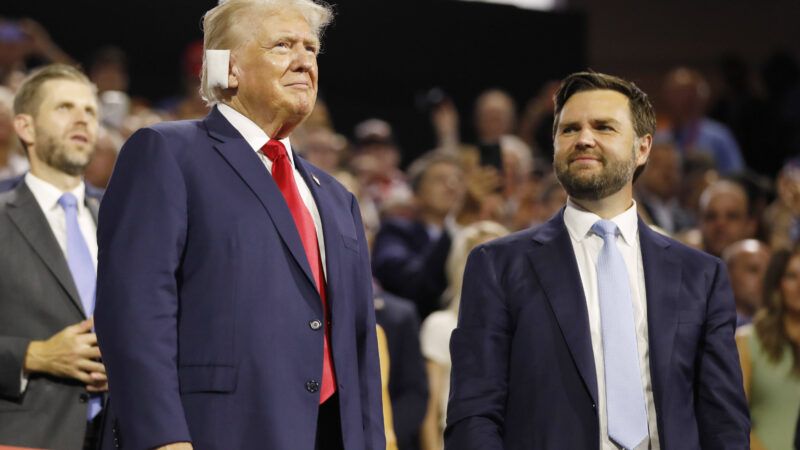J.D. Vance Thinks Lina Khan Is Doing a Great Job
We're looking at four more years of anti-tech and anti-business antics from the FTC no matter who wins this November.

With former President Donald Trump's pick of Ohio Rep. J.D. Vance as his 2024 running mate, we're likely looking at dark days at the Federal Trade Commission (FTC).
Under President Joe Biden, the FTC—headed by Lina Khan—has aggressively pursued an anti-innovation, anti-tech, anti-big business, and anti-consumer agenda. Khan and her allies in the Biden administration think the consumer welfare standard that has guided antitrust law for decades needs to go. Rather than focus on whether a company's actions or a particular merger will raise prices for consumers, they think antitrust regulators should be concerned with some amorphous concept of "competition," with making sure businesses don't get bigger, and with helping competitors to big businesses (especially big tech companies) get a leg up.
Khan's is a profoundly anti-free markets agenda, punctuated by attempts to bypass Congress and the legislative process and simply set policies administratively. Her vision seems to be of an all-powerful FTC able to target business practices and private companies based on partisan political goals, instead of the neutral arbiter of business that it is supposed to be.
J.D. Vance loves it.
"I guess I look at Lina Khan as one of the few people in the Biden administration that I think is doing a pretty good job," Vance said in February.
Vance went on to espouse a view of the markets that echoes Khan and other Democrats, saying we need to "build a competitive marketplace…that allows consumers to have the right choices and isn't just so obsessed on pricing power within the market."
It's hard to pack so much anti-free market sentiment into a few short sentences, but Vance manages. Note his assertion that it's the government's job to actively build a competitive marketplace, rather than this being a function of free competition and consumer preferences; his belief that consumers should have "the right choices" presented to them (aka the ones that some federal agency thinks they should have, demonstrated preferences be damned); and his casual rejection of the consumer welfare standard.
Vance's words would seem familiar coming from someone in the Biden administration. From a Republican, they're jarring, even in this topsy-turvy political era where all the old battle lines seem to be up for grabs.
While Khan's ideas have alienated more traditional conservatives, they've gained fans among some "Make America Great Again" Republicans, who share in Democrats' desire to take down big tech companies (albeit often for differing reasons) and stick it to big businesses.
"Vance is one of several Republican lawmakers, including Sen. Josh Hawley of Missouri and Florida Rep. Matt Gaetz, called 'Khanservatives' for their agreement with the FTC chair that US antitrust law has a broader purpose than keeping prices down for consumers," notes Reuters' Jody Godoy.
Vance has professed a desire to "break Google up" and to "break up" big tech companies.
While Vance may agree with Democrats about antitrust law and anti-tech action, Democrats may find themselves wishing, should Trump/Vance win, that they hadn't set the precedents they had at the FTC. Vance may share some broad goals with Khan and other Democrats here and their reasoning may sometimes align, but Vance has also made clear that one of his reasons for going after tech companies would be that he thinks they are too left-leaning. ("We should just seize the administrative state for our own purposes," he said in 2022.) A second Trump administration may mirror some of the tactics of Khan and the Biden administration but turn them against policies and companies that left-leaning types support.
No matter who wins the election this November, we're looking at four more years of aggressively anti-free market policies coming from the FTC.


Show Comments (11)